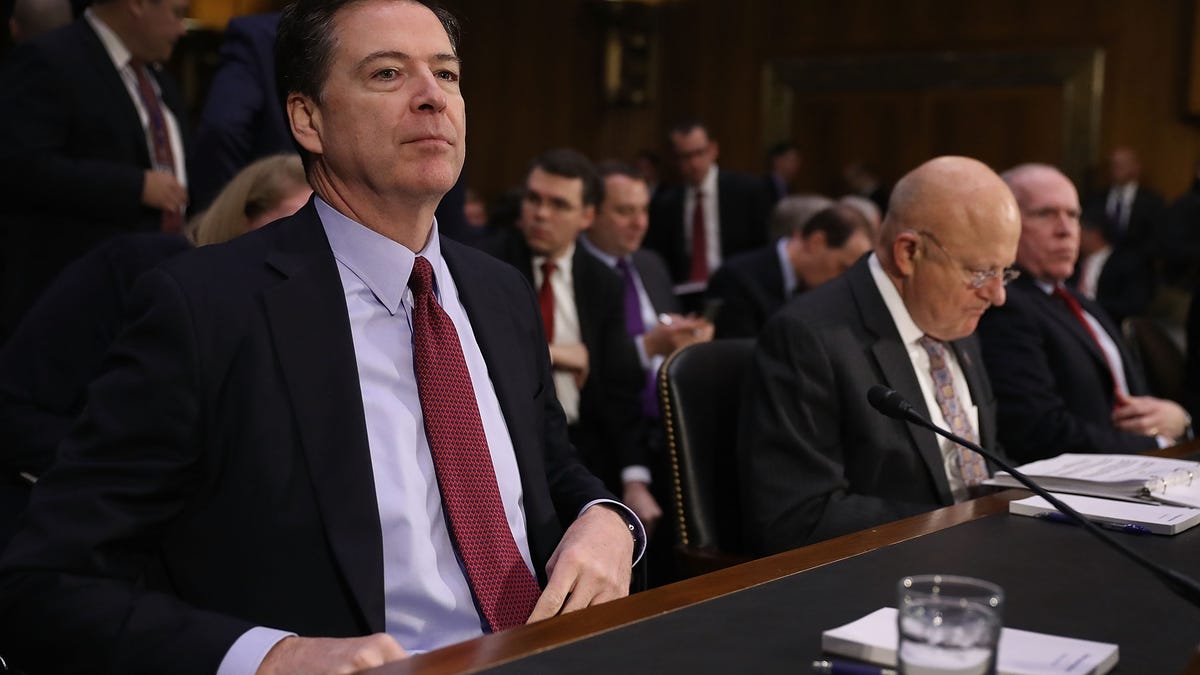Russian hacking of Republicans limited, intel chiefs say
Compared to the data theft faced by Democratic organizations, the hacks of GOP groups didn't yield much information, the FBI director tells the Senate.

FBI Director James Comey (left), Director of National Intelligence James Clapper and Central Intelligence Agency Director John Brennan wait to testify before the Senate Intelligence Committee on Tuesday.
Russians hacked Republicans during the lead up to the 2016 election, too, Federal Bureau of Investigation director James Comey told senators Tuesday.
But the hackers were only successful in penetrating state-level organizations and campaigns, as well as an old email domain no longer used by the Republican National Committee, Comey said.
"We did not develop any evidence that the Trump campaign or the current RNC was successfully hacked," Comey said.
Comey, joined by Director of National Intelligence James Clapper, Central Intelligence Agency director John Brennan and National Security Agency director Admiral Michael Rogers, spoke during the the Senate Intelligence Committee's first public hearing on Russian hacking and propaganda efforts that aired emails from Democratic political groups and leaders during the 2016 presidential campaigns.
The question of how much Republican organizations and figures were hacked plays into the sensitive topic of whether Russian spies intended specifically to help Republican candidate Donald Trump's campaign. On Friday, the CIA, FBI and NSA released a joint report saying all three spy agencies agreed that Russian President Vladimir Putin personally ordered the campaign and did indeed favor Trump for the American presidency.
The release of that report left out any evidence proving that Russian intelligence agencies were behind the hacking and leaking of documents. Critics, including WikiLeaks founder Julian Assange as well as Russian officials, said the report was baseless. On Tuesday, intelligence officials behind the report reiterated that they can't talk about how they reached their conclusions without jeopardizing their sources. Sen. Richard Burr, a Republican from North Carolina and the Senate Intelligence Committee chairman, said the committee plans to vet the intelligence agencies' sources itself in a classified setting.
Comey's remarks on Tuesday helped clear up conflicting information that came out in December. That's when The New York Times reported that the RNC had been hacked by Russian spies, too, but RNC director Reince Priebus denied that the hacks happened.
None of the data taken from state-level campaigns or the old RNC email domain were released, Comey said Tuesday.
Republican Sen. Tom Cotton of Arkansas pushed back on the intelligence community's assessment that the hacking, leaking and propaganda efforts were meant to support Trump's candidacy. He asked pointed questions about when Putin decided Trump could actually win the campaign.
"Is it possible that they only leaked the Clinton material because they thought she was going to win?" Cotton asked, to which Clapper replied that was a logical conclusion.
However, other Republicans made it clear they didn't care who the hacks helped or hurt this time around, only that they represented interference in US politics from a foreign government.
"Neither political party should be taking this lightly," said Florida Sen. Marco Rubio, who ran in the Republican presidential primary. "This is not a partisan issue."
Democrats pounced on the opportunity to question Comey about whether the FBI is investigating communications between Trump's campaign advisers and Russian officials. Comey declined to comment on whether there was any ongoing investigation.
Sen. Ron Wyden, a Democrat from Oregon, said he would expect an answer to his question during a future classified briefing with Comey. But he also said the information shouldn't stay classified.
"I think the American people have a right to know this," Wyden said. "If there is delay in releasing information to the American people before January 20, I'm not sure it's going to happen."
Tech Enabled: CNET chronicles tech's role in providing new kinds of accessibility. Check it out here.
Life, disrupted: In Europe, millions of refugees are still searching for a safe place to settle. Tech should be part of the solution. But is it? CNET investigates.

